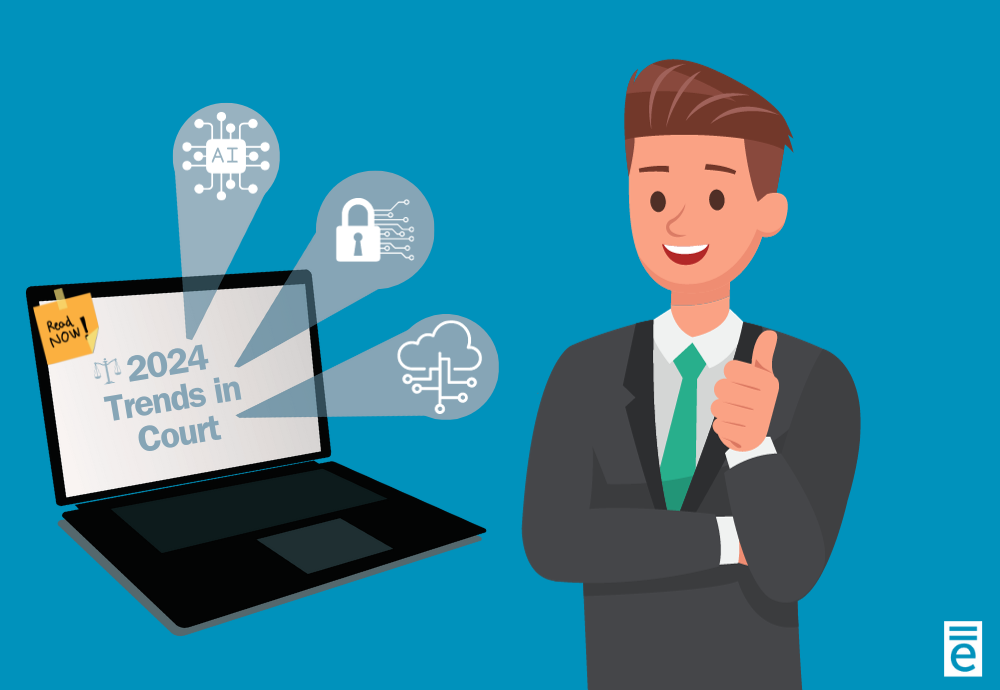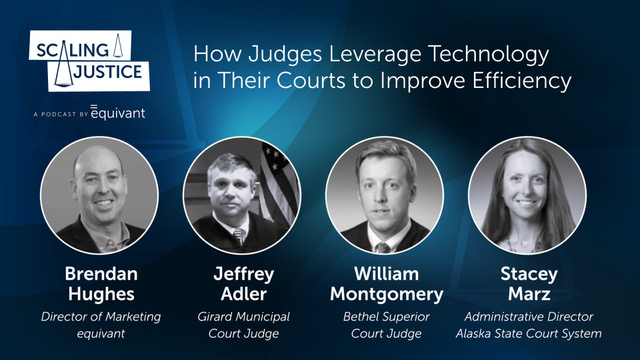While artificial intelligence (AI) has been around for a while, it made a big splash in 2023, and the implications for courts are huge. Additionally, offering virtual court services remains a top priority in the legal industry. Most courts aren’t going fully virtual, but many have started adopting hybrid approaches to help ensure underserved communities and self-represented litigants (SRLs) have equitable access to court services. As the new year ramps up, here are the top 5 trends to prepare for in 2024:
1. Artificial Intelligence Will Help Address Staffing Challenges
The elephant in the room (i.e., court) is AI. There are so many components of AI, many of which we are still learning about. While there are different use cases, the implications for the legal industry are huge. In 2024, we expect to see more courts exploring what AI means for them specifically and determining the measurable gains of its use.
It’s no secret that many courts have struggled with staffing challenges. As courts see more people retire, fewer people apply, and continued budget cuts, they have to get creative. Leveraging AI to tackle some of the repetitive, tedious tasks such as legal research, drafting contracts, review/analysis, and filing documentation is one way to do this. For example, bots and machine learning are now being leveraged to assist with eFiling. As more documentation is filed, the system begins to learn and understand contingencies (i.e., if one document is filed, it needs to be filed with something else). Bots allow the entire filing process to be automated while still identifying any discrepancies and sending those on to a clerk.
AI does not replace human intervention. In fact, bias tendencies can still be present within AI. However, it’s a compelling solution that has the power to innovate the legal industry and redefine the way courts function.
2. Technology Vendors Will Help Courts Prioritize Cyber Security
Cyber security will always be a priority if technology is involved. Hackers are continually finding new ways to access private data. This is an especially significant issue for courts because of the types of data and information they have.
As courts prioritize cyber security, technology vendors must follow suit. Any case management system (CMS) or integration component used in the legal industry should follow the CJIS standards from the FBI. Additionally, courts need to ensure that their technology vendor offers support for cyber security, whether their CMS is on-premises or hosted in the cloud.
At equivant, following CJIS standards was a priority when our CMS, JWorks, was developed. In addition, JWorks is working to be StateRAMP compliant in 2024. As courts continue to evaluate and improve their cyber security practices, we are prepared to support them. Cyber Security will be an ongoing trend for years to come as the processes and standards are continually evolving.
3. More Courts Will Adopt Cloud-Based Technology
Despite the normalization of remote work environments, courts still rely heavily on physical documents and conduct most work in person. However, more courts are considering adopting cloud-based solutions to improve and simplify workflows. Some of the benefits of cloud-based systems include:
- Judges and clerks are alleviated from managing IT and security processes, which can be a major headache.
- Cloud-based systems bring all agencies under one umbrella and help to ensure quality, consistent data (another 2024 trend).
- Translation and transformation are simplified.
- Cloud-based systems provide turnkey solutions for scalability and flexibility.
Cloud-based systems can be a good option for any size court as long as they take time to understand the pluses and minuses. Additionally, when adopting cloud-based technology, it’s important that courts choose a credited provider that follows StateRAMP and FedRAMP protocols and offers secure environments.
4. Courts Will Enhance and Improve Virtual Services
Over the last several years, offering virtual court services has been a hot topic. While many courts have adopted some types of virtual technology, there is still a lot of momentum to enhance and improve offerings. Much of the momentum relates to accessibility, particularly for underserved communities and SRLs.
As more public-facing portals are introduced, it’s essential that technology vendors comply with Web Content Accessibility Guidelines (WCAG) to ensure portals are accessible to people with diverse needs. Additionally, not everyone has access to a computer. As such, it’s critical that websites and portals can function well across all devices.
It’s also important for courts to meet community members where they’re at. It’s not financially or logistically feasible for everyone to take a day off work and pay for childcare to appear in court. Fortunately, Online Dispute Resolution tools exist so constituents can resolve family cases, small claims, and traffic/criminal cases online from anywhere.
5. The Push for Quality Data and the Adoption of NODS Will Continue
Ensuring fairness and equality in the court system is important. Providing quality data that’s easy to access and understand is a big part of that. But without a set of standards, providing good data can feel like an uphill battle. Fortunately, the National Center for State Courts (NCSC) has addressed this with the National Open Data Standards (NODS) initiative, which provides rules around how data are defined and recorded.
NODS ensures vendors (like equivant) and courts communicate accurately so that the system is fair for everyone. It also allows easier access to reporting and statistics, higher-quality data, and more efficient collaboration. While establishing NODS was a step in the right direction, there is still an overall awareness issue. As 2024 progresses, you can expect to see vendors and courts working together more frequently to promote the widespread adoption of NODS and continue pushing for quality data. The staff at equivant have and will continue to make this a priority through our involvement with committees.
If you need help preparing for or supporting any of these trends in 2024, we’re here to help.




